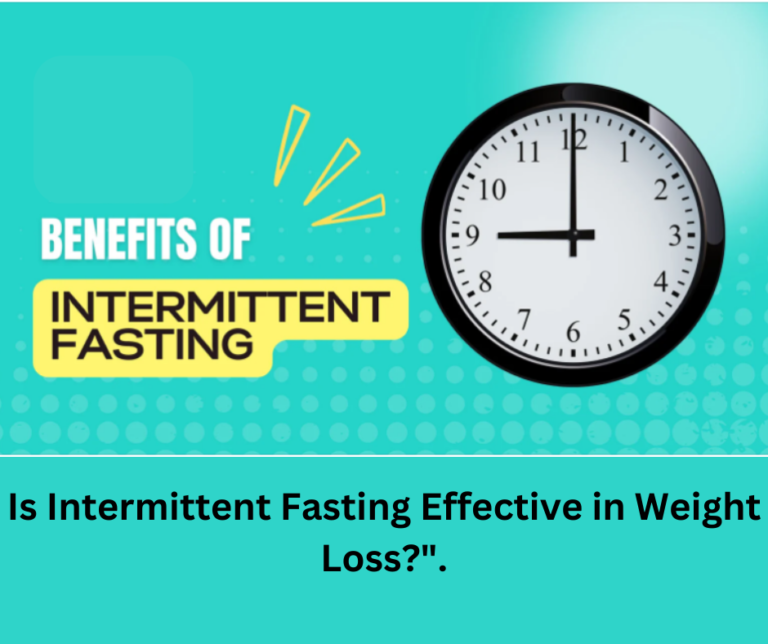Intermittent fasting has become increasingly popular in recent years, with many people using it as a weight loss strategy.
Here are some points to consider regarding the effectiveness of intermittent fasting in weight loss:

Calorie Restriction:
Intermittent fasting involves restricting food intake for a certain period, which leads to a calorie deficit.
This means that individuals consume fewer calories than they burn, which can result in weight loss.
Types of Intermittent Fasting:
There are several types of intermittent fasting, including 16/8 fasting, alternate-day fasting, and 5:2 fasting.
These methods vary in terms of the time-restricted eating window and the frequency of fasting.
Research Evidence:
Several studies have shown that intermittent fasting can lead to weight loss. One study published in the International Journal of Obesity found that alternate-day fasting led to an average weight loss of 8.5 pounds over eight weeks in obese adults.
Reduction in Body Fat:
Intermittent fasting can lead to a reduction in body fat, which is linked to improved health outcomes.
One study found that 16/8 fasting led to a significant decrease in body fat percentage in healthy adults.
Potential Health Benefits:
Intermittent fasting has potential health benefits beyond weight loss. Studies have shown that it can improve insulin sensitivity, lower blood pressure, and reduce inflammation.

Balanced Diet:
It is essential to combine intermittent fasting with a balanced diet to achieve optimal results.
A healthy diet that includes nutrient-dense foods such as fruits, vegetables, whole grains, and lean proteins is crucial for overall health and weight loss.
Individual Differences:
The amount of weight loss that an individual experiences with intermittent fasting can vary depending on factors such as starting weight, age, sex, and activity level.
It is essential to speak with a healthcare provider before starting an intermittent fasting regimen to ensure it is appropriate for your health status and personal goals.
Adherence:
While intermittent fasting can be an effective weight loss strategy, adherence to the regimen can be challenging for some individuals.
It is important to find a fasting schedule that works for you and to be flexible with it as needed.
Muscle Mass Preservation:
Intermittent fasting has been shown to help preserve muscle mass while losing weight.
Unlike other diets that may lead to muscle loss along with fat loss, intermittent fasting allows for the preservation of muscle mass, which is important for overall health and fitness.
Reduced Hunger:
Some people report feeling less hungry when they are following an intermittent fasting regimen.
This can make it easier to stick to the fasting schedule and can lead to fewer cravings for unhealthy foods.
Improved Metabolic Health:
Intermittent fasting can lead to improvements in metabolic health, including better blood sugar control, improved cholesterol levels, and reduced insulin resistance.
These benefits can have a positive impact on overall health and can also aid in weight loss.
Flexibility:
Intermittent fasting can be a flexible approach to weight loss, allowing individuals to choose a fasting schedule that works for their lifestyle.
This flexibility can make it easier to adhere to the regimen and can also help to prevent feelings of deprivation or restriction.
Long-term Sustainability:
Intermittent fasting can be a sustainable approach to weight loss for some individuals.
By allowing for periods of unrestricted eating, it can help to prevent feelings of deprivation and may be easier to stick to over the long-term compared to other diets that restrict certain foods or food groups.
Potential Downsides:
While intermittent fasting can be effective for weight loss and has potential health benefits, there are some potential downsides to consider.
Some people may experience negative side effects such as headaches, fatigue, or mood changes.
Additionally, it may not be appropriate for everyone, such as those with a history of disordered eating or certain medical conditions.
Conclusion:
Intermittent fasting can be an effective tool for weight loss when combined with a healthy diet and regular exercise.
However, it is not a one-size-fits-all solution, and it is important to speak with a healthcare provider before starting an intermittent fasting regimen.
Disclaimer:
We are a professional product review website. We might receive compensation when you buy through our website.
We may earn a small commission. The information contained on this website is provided for informational purposes
only and is not meant to substitute for the advice provided by your doctor or other healthcare professional.
The products have not been evaluated by the Food and Drug Administration and are not intended to diagnose, treat,
cure, or prevent any disease.
